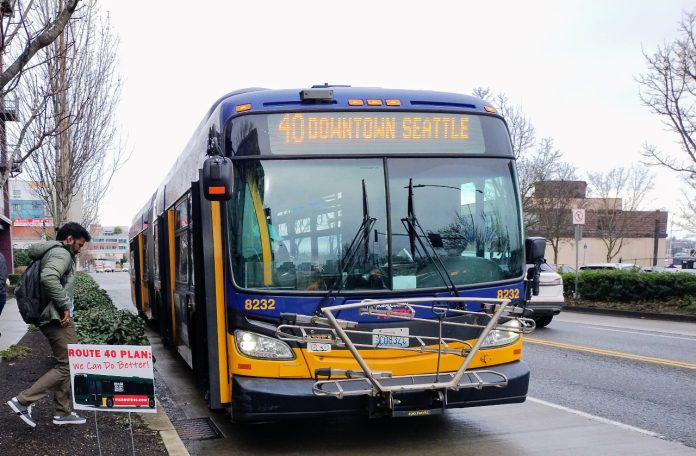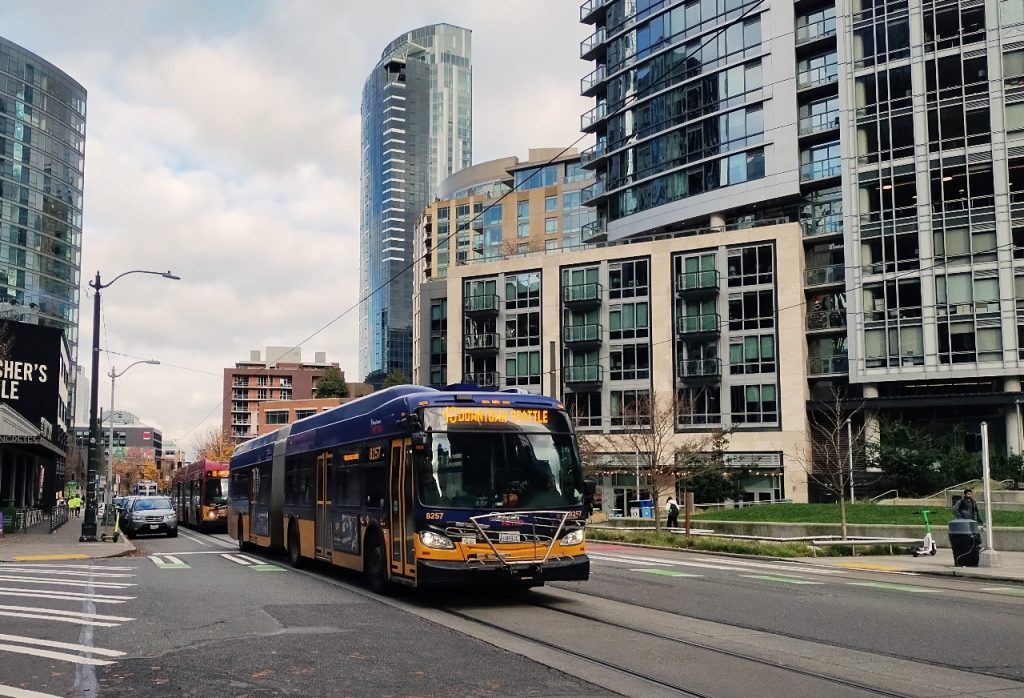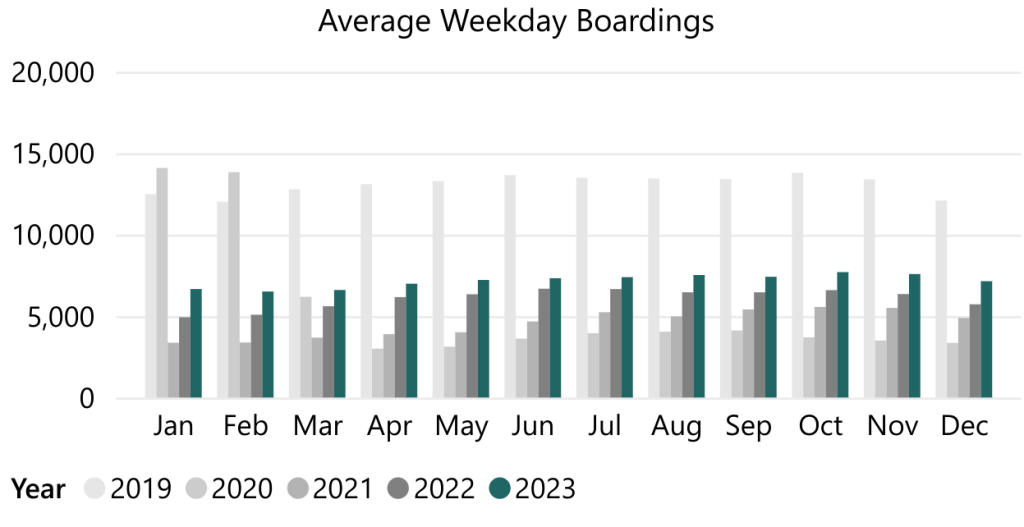
A project upgrading the speed and reliability of North Seattle’s Route 40 has been out to bid seeking contractors for weeks, but business and freight advocates haven’t given up on their push to pause and scale back the project. New signs have popped up along the route in the Westlake and Fremont neighborhoods, seeking a last-minute reassessment of the dedicated bus lanes and pedestrian improvements that have been in the works for over three years.
However, a new letter-writing campaign in support of the bus upgrades looks to counteract some of this last-minute opposition. Ballard Fremont Greenways and the Seattle Transit Riders Union have teamed up to create a new petition that has already resulted in over 3,000 letters sent to the City asking to keep the project moving. “SDOT has worked with our communities for over 3 years, incorporating feedback from all stakeholders, to design a project that will improve the Route 40 Corridor for all road users,” the petition’s website notes. “Every day this project is delayed is another day waiting for a late bus and more taxpayer money spent on unnecessary studies.”
Business opposition to setting aside dedicated space on Westlake Avenue N, Leary Avenue NW, and NW Market Street to buses has been simmering since 2021, even as feedback on specific cross-sections and project elements put forward by the City has resulted in major changes to its design since the first meetings in 2020. A new website, fixroute40.com, linked with QR codes on signs all along the 40’s route, claims that “we can do better,” despite not including any alternative proposal anywhere on the site.
The website quotes Sooz Appel, a property owner along Westlake Avenue N, as asking for no dedicated space for buses whatsoever. “It won’t improve safety, it will increase congestion when the bridge is open and won’t eliminate accidents. We say to SDOT: No bus-only lanes,” it reads.
The new yard signs are timed with another push to get city leadership to pause the project. On January 4, just days after the Seattle Department of Transportation (SDOT) announced that the Route 40 project was going out to bid, Mike Stewart, Executive Director of the Ballard Alliance, a business advocacy group for the neighborhood, sent an email to SDOT Director Greg Spotts expressing concerns about the “neighborhood impacts” of the Route 40 proposal.

“In addition to a detailed and thorough response to our concerns from your department, our goal is simple: we’d like to work together with SDOT leadership to reach a compromised solution for the proposed Route 40 changes that can both achieve transit time improvements and significantly diminish the impacts the current proposal presents for our communities,” Stewart wrote.
A full letter was attached, most of the language re-used from a letter that had been sent last summer, which had been co-signed by Pete Hanning, the executive director of the Fremont Chamber of Commerce who ran unsuccessfully against Councilmember Dan Strauss in 2023, Appel, who is also Hanning’s mother, and Eugene Wasserman, the President of the North Seattle Industrial Association. Wasserman is an outspoken critic of SDOT who opposed the Move Seattle Levy and has fought against completion of the Burke-Gilman Trail’s Missing Link on Shilshole Avenue NW as part of the “Ballard Coalition.”
Between last summer and this month, the letter asking for a pause has now been co-signed by a long list of Ballard, Fremont, and Westlake business owners including Fremont Dock Company’s Suzie Burke, the National Nordic Museum’s Eric Nelson, and Jay Jennings of the NW Marine Trade Association. A number of small businesses located directly on the Route 40, including the owners of Ballard’s Secret Garden Books and Annie’s Art and Frame also signed onto the letter. Both businesses are set to lose access to a few parking spaces directly in front of their front doors as SDOT extends an existing bus bulb to create space for two buses to use the stop at the same time.
With its latest letter, “Route 40 Coalition” continues to cite lower daily ridership on the 40 compared to pre-pandemic levels. Even as they advocate for keeping the route slower and more unreliable, the group asserts that most people accessing Ballard will continue to do so via personal car even for major events.
“Accessing west Ballard via Leary Avenue NW or NW Market Street, mostly via car, is the primary route for the tens of thousands of (mostly tourist) visitors who head to the Ballard Locks and National Nordic Museum,” the letter reads. “Even for the tens of thousands of local visitors who attend the very popular annual summer events in the heart of downtown Ballard (SeafoodFest, Syttende Mai Parade), our data shows that most do not arrive via bus. Encouraging local and family bus use to annual Seattle events will need a dedicated marketing effort from SDOT.”
Yet the Route 40, with well over 7,000 boardings on the average weekday in 2023, remains one of King County Metro’s most frequently used buses and continues to gain ridership. Compared to December of 2022, this past December saw a ridership increase of nearly 25% on weekdays, or over 1,400 additional daily riders. Riders are returning to buses like the 40, even as one out of every four trips continues to run late. The focus on pre-pandemic ridership is a fairly transparent ploy to paint the route as unsuccessful and not worthy of investment, and at the same time ignores the potential gains to ridership that will come from increased speed and reliability. Pre-pandemic Route 40 ridership peaked above 13,000 daily boardings in 2019, which made it Metro’s third highest-ridership bus route.

A $3 million federal grant for this project awarded via the Puget Sound Regional Council means that the city isn’t fully in control of its own timeline, with grant obligation deadlines looming. So far, SDOT has not signaled it is prepared to make any more concessions, especially with the design materials already in contractor’s hands for reviews. But until the construction contract is signed, advocates for a faster and more reliable Route 40 won’t be holding their breath.
Take action: Sign the letter urging SDOT to preserve the Route 40 upgrades.
Ryan Packer lives in the Summit Slope neighborhood of Capitol Hill and has been writing for the The Urbanist since 2015. They report on multimodal transportation issues, #VisionZero, preservation, and local politics. They believe in using Seattle's history to help attain the vibrant, diverse city that we all wish to inhabit. Ryan's writing has appeared in Capitol Hill Seattle Blog, Bike Portland, and Seattle Bike Blog, where they also did a four-month stint as temporary editor.


